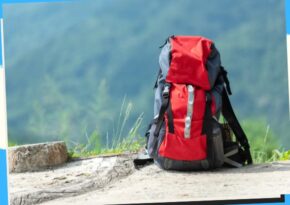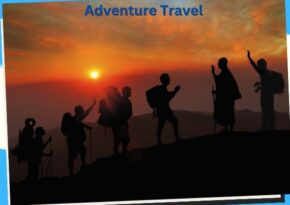✍️ Writers on the Road: How to Craft Stories while Backpacking! 📖🏕️
🌄🎒 Combine the worlds of books and backpacks as you embark on the ultimate journey of reading and writing amidst picturesque landscapes.
🎒📚 Backpacking Literature: Reading and Writing on the Road 🌍🖋️
Backpacking is an adventure of the body and the soul. It’s a journey that takes you to far-flung corners of the earth, but it’s also a voyage deep within yourself. What better way to accompany these physical and spiritual explorations than with a good book or a journal to capture the memories and reflections that fill your days and nights on the road? In this guide, we’ll delve into the world of backpacking literature, exploring the joys of reading and writing as you wander through the world’s wonders. 🚶♂️🎒📖
The Art of Reading and Writing on the Road 📚🌄
Traveling is a form of storytelling, and reading and writing complement this narrative beautifully. When you combine backpacking with literature, you embark on a journey of discovery and creation. Here’s why reading and writing are essential companions to your backpacking adventures:
1. Connection to the World: Books allow you to connect with the culture, history, and stories of the places you visit. Whether reading a novel set in the destination or a travelogue written by a fellow wanderer, literature bridges the gap between you and the world around you.
2. Emotional Enrichment: Books can evoke emotions, making your travels more meaningful and profound. They can transport you to different times, worlds, and perspectives, enriching your emotional experience.
3. Reflective Journeys: Writing, on the other hand, is a form of self-reflection. Keeping a travel journal or writing poetry, essays, or stories during your journey can help you process your experiences, discover personal insights, and preserve precious memories.
4. Creativity Unleashed: Backpacking often creates a heightened sense of inspiration. Writing allows you to channel your creative energy and produce work inspired by the beauty and diversity of the world.
5. Connection to Other Travelers: Sharing books or writing with fellow travelers can be a bonding experience. You may discover a shared love for a particular author or find inspiration in each other’s travel tales.
Packing Your Literary Companions 🎒📚
Selecting the right books and writing tools is an art in itself. Here’s how to pack your literary companions for your backpacking journey:
1. E-Readers: E-readers like the Kindle are lightweight and versatile. You can carry an entire library in a device that weighs less than a single paperback.
2. Travel-Friendly Paperbacks: Choose lightweight, compact paperbacks or travel editions of your favorite books. You can find condensed versions of classic literature, perfect for backpackers.
3. Audiobooks: Audiobooks are perfect for long bus rides or quiet evenings in your tent. You can listen to your favorite stories while your eyes rest.
4. Notebooks and Journals: Invest in a high-quality notebook or journal for your writing. Consider a compact size and durable cover that can withstand the rigors of travel.
5. Writing Tools: Choose your writing tools carefully. Some backpackers prefer pens, while others opt for portable keyboards to write on their electronic devices.
6. Travel Literature: Select literature related to your destination or interests. Whether it’s a novel set in the region or a travel guide, these books can enhance your experience.
Reading Adventures 📖🌍
Reading on the road is a unique experience. You can lose yourself in a book surrounded by the world’s beauty. Here are some reading adventures that may inspire your next backpacking journey:
1. Reading on the Beach in Thailand: Picture yourself lying on a pristine beach in Thailand, the warm sand beneath you, and a book in your hand. The sound of the waves and the scent of the sea accompany your literary voyage.
2. Exploring the Amazon Rainforest with a Classic Novel: Imagine journeying deep into the Amazon rainforest with a classic adventure novel like “Heart of Darkness” by Joseph Conrad as your literary guide. The lush greenery and the sense of exploration make the story even more vivid.
3. Classic Literature in European Cafes: Backpacking through Europe offers the opportunity to visit charming cafes and immerse yourself in classic literature. Sip coffee in a Parisian café while reading Victor Hugo’s “Les Misérables,” or enjoy gelato in Rome with Dante’s “Divine Comedy.”
4. Poetry in the Himalayas: The majestic peaks of the Himalayas provide an awe-inspiring backdrop for reading poetry. Whether you’re reciting the verses of Rumi or writing your haikus, the mountains amplify the beauty of words.
5. Travelogues on Long Train Journeys: Train travel is a poetic way to experience a country. Reading a travelogue or journal of a writer who explored the same landscape by train enhances your journey. The rhythmic clatter of the wheels complements the written word.
Writing as a Travel Companion 🖋️🌄
Writing on the road is a creative and reflective endeavor. Your travel journal can become a cherished travel companion, preserving the moments, thoughts, and emotions of your journey. Here are some writing experiences that may ignite your wanderlust:
1. Sunset Musings in the Sahara Desert: Picture yourself in the vastness of the Sahara Desert, sitting on a dune as the sun dips below the horizon. You pick up your journal and pen and let the sunset colors inspire your words.
2. Rainy-Day Reflections in a Japanese Ryokan: While staying in a traditional Japanese ryokan during a rainy day, you find solace in the gentle sound of the rain on the roof. The paper of your journal soaks in the beauty of Japanese culture and your reflections.
3. Journaling by Firelight in Patagonia: In the wild landscapes of Patagonia, you light a campfire and open your journal. The crackling flames illuminate your thoughts and stories, and the stillness of nature deepens your connection to the page.
4. Writing Letters to Loved Ones from a Parisian Café: In a charming Parisian café, you write letters to loved ones back home. The aroma of freshly baked croissants and the bustling streets of Paris provide the backdrop for your heartfelt words.
5. Creating Poetry in a Balinese Jungle Retreat: Surrounded by the lush beauty of a Balinese jungle retreat, you find inspiration in the vibrant flora and fauna. You capture the essence of your surroundings in poetic verses.
Personal Stories of Literary Wanderers 📚🌄
To offer a glimpse into the world of backpacking literature, let’s explore the personal stories of travelers who have embarked on literary journeys of their own:
1. Sophie’s Himalayan Haikus: Sophie, a poet from Canada, embarked on a solo trek in the Himalayas. Each day, she composed haikus inspired by the stunning mountain vistas and the spiritual atmosphere of the region.
2. Nathan’s Trans-Siberian Train Tales: Nathan, an Australian writer, undertook the epic journey of the Trans-Siberian Railway. He wrote a travel journal with anecdotes, observations, and conversations with fellow passengers.
3. Mia’s Mediterranean Memoir: Mia, a traveler from Italy, backpacked through Mediterranean countries. She created a travel memoir that weaves personal experiences with historical and cultural insights, offering a unique regional perspective.
4. Eduardo’s Amazon Adventure: Eduardo, an adventurer from Brazil, explored the Amazon rainforest. He wrote a journal that captures the mystery and beauty of the jungle, from encounters with exotic wildlife to moments of self-discovery.
5. Isabella’s Café Chronicles: Isabella, a writer from France, embarked on a journey through European cafes. In each café she visited, she wrote reflections and short stories inspired by the atmosphere, people, and conversations around her.
The Ethical Writer and Reader 🌿📖
Responsible literature practices go hand in hand with ethical travel. Here are some principles for being an ethical writer and reader on the road:
1. Support Local Authors: When visiting a new country, seek out literature written by local authors. Reading their works can provide unique insights into the culture and perspectives of the region.
2. Respect Copyright Laws: Be mindful of copyright laws when copying or sharing written works. Respect the intellectual property of authors and publishers.
3. Minimize Environmental Impact: Choose e-readers or digital formats to reduce paper consumption. If you prefer physical books, consider sharing or donating them after reading.
4. Be Respectful of Local Cultures: When writing about the places you visit, be sensitive to local customs, traditions, and values. Your words should reflect respect and cultural understanding.
Final Words and Literary Wanderlust 🌍📚
Backpacking literature is a journey within a journey, a story within a story. As you roam the world with a book in your hand or a pen in your pocket, you discover not only the places you visit but also the depths of your soul. The words you read and write become footprints in the sand of your life’s adventure.
So, pack your literary companions, embrace the beauty of the world, and let your own story unfold. Whether reading a novel on a remote beach or writing poetry in a mountain cabin, the written word will be your faithful travel companion, capturing the essence of your backpacking journey. Happy reading and writing, fellow wanderers! 🎒🌏📖
Save/Share this story with a QR CODE
Key Phrases:
Embark on adventures through words with backpacking literature for bookworms.
Craft stories on the go as writers hit the road with backpacks and journals in tow.
Combine books and backpacks for the ultimate journey of reading and writing.
Satisfy your literary wanderlust with backpacking reading adventures on the road.
Master the art of writing on the move, making the outdoors your muse.
Please be advised that the information presented here is subject to change, and it is highly recommended to consult local authorities for the latest and most accurate updates.
Feel free to email us if we have overlooked travel and tourism guides, safety tips, recreational options, leisure activities, or any useful links. Your feedback is valuable to us, and we’re here to assist you in any way we can!
DisclaimerThe information is for educational purposes only and subject to change, and it is highly recommended to consult local authorities for the latest and most accurate updates. We do not constitute endorsement of any specific technologies or methodologies or endorse of any specific products or services.📩 Need to get in touch?Feel free to Email Us for comments, suggestions, reviews, or anything else. |








Comments (0)